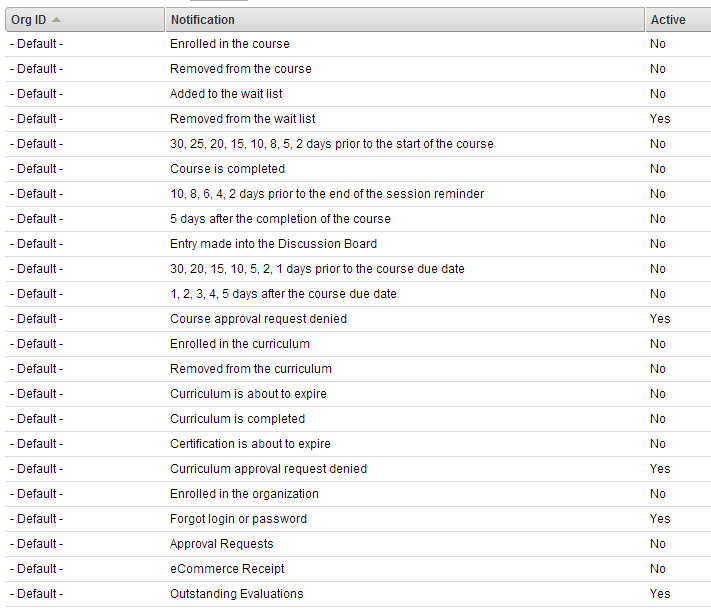
The CourseMill notification system provides for customized messages for an organization, curriculum, course or session. Messages may be plain text or HTML and can be modified to meet your needs. A sample template that comes with the system is shown below.
Notice the system variables that you can use designated by <#xxxxxxxxx#>. In the case below the system will automatically insert the user’s first name to personalize the message. Then the system will insert the user’s ID and password automatically, as well as the link to CourseMill. Later in this document you will see all the system variables that are available to you for use in notifications.
Since all notifications are initially set up as basic templates, it is best to revise all those templates in one administrative session so that you don’t have to change them for each course, curriculum, or session.
These templates appear on the Manage Notifications page as defaults. These templates will only display if you have the organization set to ALL (which is usually only available to the global administrator of CourseMill), which means the templates are set up for your entire database crossing all organizations. They can still be later modified at the lower course/curriculum/session levels.

When setting a template/default notification Active, it will make the same notification active for any new organization, course, curriculum or session. For example, if the Course approval request denied notification is made Active, any time a new course is created, this notification for that course will also be made active. If there is a course for that organization that you want for it not to be active, you will have to change that specific course’s notification.
The system variables for specific organization, curriculum, course, or session fields that you code in the notification email must be spelled exactly as shown below.
| Text-Variable | Replacement text |
|---|---|
| <#START_DATE#> | Start date of the course or curriculum |
| <#END_DATE#> | End date of the course or curriculum |
| <#LOCATION#> | Location of the course or curriculum |
| <#LOCATION_DESCRIPTION#> | The description of the location |
| <#COURSE_NAME#> | Name of the course |
| <#CURRICULUM_NAME#> | Name of the curriculum |
| <#SESSION_NAME#> | Name of the session |
| <#INSTRUCTOR_NAME#> | Name of the instructor |
| <#USER_ID#> | Student's user ID |
| <#USER_FIRSTNAME#> | Student's first name |
| <#USER_LASTNAME#> | Student's last name |
| <#USER_FULLNAME#> | Student's full name |
| <#USER_PASSWORD#> | Student's password |
| <#USER_SUBORG0#> thru <#USER_SUBORG15#> | Defined sub-org values |
| <#USER_PERSINFO0#> thru <#USER_PERSINFO7#> | Defined user definition values |
| <#APPROVER_NAME#> | Name of the person that approved the student |
| <#DENIED_COMMENT#> | Comment provided for denied approval |
| <#CM_LINK#> | CourseMill Log-in URL |
| <#MEETING_DAYS#> | Days of the week that the session meets |
| <#START_TIME#> | Session start time |
| <#END_TIME#> | Session end time |
| <#COURSE_NOTES#> | Course notes |
| <#COURSE_DESC#> | Course description |
| <#COURSE_LAUNCH#> | URL that allows the student to log-in. When the student is logged in, the course is automatically launched. This is encrypted to protect the username and password. |
| <#SESSION_NOTES#> | Session notes |
| <#WAITLIST_POSITION#> | Position on the waitlist, if enabled |
| <#CREDIT_HOURS#> | Number of credit hours earned |
| <#COMPLETION_DATE#> | Course completion date |
| <#DUE_DATE#> | Course due date |
| <#DB_NAME#> | Database name |
| <#TOPIC_NAME#> | Discussion board topic name |
| <#TOPIC_ENTRY#> | Discussion board topic entry |
| <#TOPIC_POSTER#> | Name of the discussion board topic poster |
| <#SCORE#> | Score for the course |
| <#PURCHASE_DATE#> | Date of purchasing the course |
| <#FOREACHITEM#> | Number of items purchased |
| <#CATALOG_TYPE#> | Type of course catalog |
Support | About ELB Learning
© ELB Learning 2022